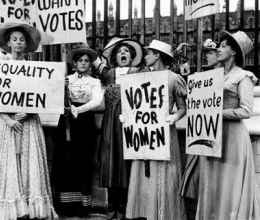For those of us who grew up in Maine, the name Margaret Chase Smith is one we’ve heard since we were little children. Her place in history is undeniable: the first woman to represent our state in Congress; the first woman from any state to serve in both the House and the Senate; and the first woman in American history to run for president for a major party.
This week, in celebration of Women’s History Month, our entire staff will be blogging about a handful of important Maine women. There are obviously too many to cover in a week, or a month, or a year, but we’ll highlight a few of our personal favorites. Smith’s legacy is so strong and her story so well known that I thought it best to highlight just one moment from her illustrious career.
On June 1, 1950, Smith rose to speak on the floor of the U.S. Senate. Less than four months earlier, Joe McCarthy had infamously revealed his “list of names,” and no member of Congress had yet to speak out against his anti-Communist witch hunt that was gripping the nation.
But Smith would have none of it. With McCarthy sitting just two rows behind her, she denounced his tactics (though not mentioning him by name) and offered a robust defense of the right to free speech. Only six of Smith’s colleagues signed onto her declaration, leading McCarthy to coin the term “Snow White and the Six Dwarfs.” But President Truman saw it differently, telling Smith that her speech was “one of the finest things that has happened here in Washington in all my years in the Senate and the White House.”
I encourage you to read Smith’s full speech, which she deemed her “Declaration of Conscience.” You can find it by clicking here. Much of it deals with the politics of the time. But the universal themes of civil liberties and the courageousness of the speech, especially given the moment at which it was given, are impossible to ignore. Here is my favorite passage:
I think that it is high time that we remembered that we have sworn to uphold and defend the Constitution. I think that it is high time that we remembered; that the Constitution, as amended, speaks not only of the freedom of speech but also of trial by jury instead of trial by accusation.
Whether it be a criminal prosecution in court or a character prosecution in the Senate, there is little practical distinction when the life of a person has been ruined.
Those of us who shout the loudest about Americanism in making character assassinations are all too frequently those who, by our own words and acts, ignore some of the basic principles of Americanism --
The right to criticize;
The right to hold unpopular beliefs;
The right to protest;
The right of independent thought.
The exercise of these rights should not cost one single American citizen his reputation or his right to a livelihood nor should he be in danger of losing his reputation or livelihood merely because he happens to know some one who holds unpopular beliefs. Who of us doesn't? Otherwise none of us could call our souls our own. Otherwise thought control would have set in.





